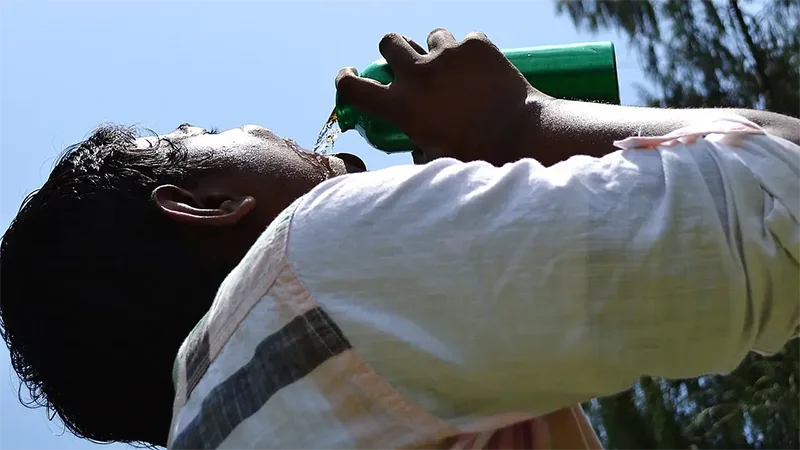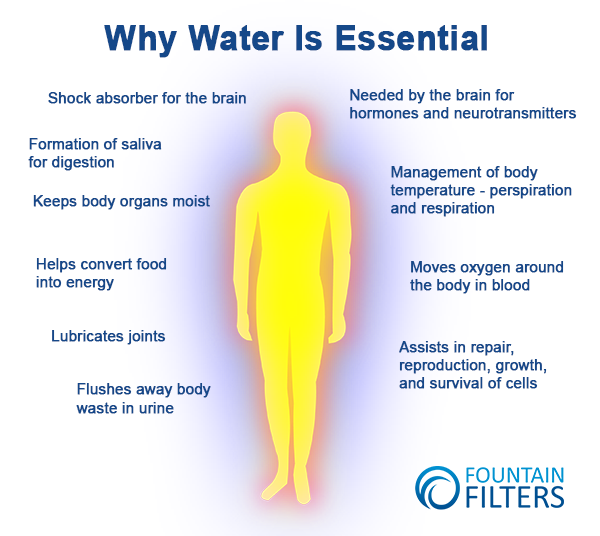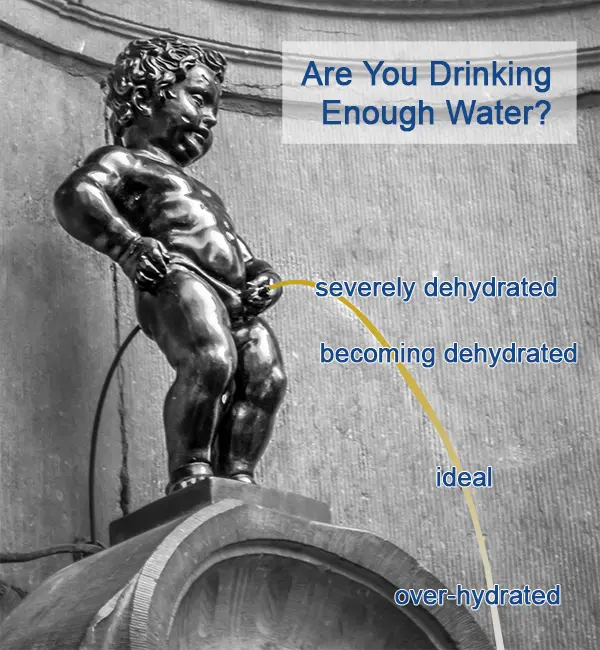how much water should you drink daily
- Guides
- by Louise
- 06-12-2024

How much water should you drink daily?
How many litres of water a day should we all be drinking? Usually, adults need to drink between 1-1 1/2 litres of water per day.
How much water a day is too much? If your urine has no colour, you're probably drinking too much water.
These appear relatively straightforward questions, but the answers may require more in depth explanation. Nothing is ever that simple!
The amount of water you should drink daily is dependent on several factors, your age, size, level of physical activity, medical problems, medicines you take, how much water you’re taking on board through the foods you eat.
This article aims to give you some general guidelines that will help you navigate how much water you are meant to drink a day.
We’re going to concentrate mainly on water in this article because it’s readily available straight from your kitchen tap. Water is calorie free, sugar free, and the most healthy, essential and beneficial for your body.
Why is water essential for health?
Water is an essential and vitally important part of your life. Without it you would die.
While researching, different sources threw out ‘similar but different’ information about how much of the human body is water. So, we’re going to sit in the safe zone and say that the human body is made up of about 50-70% water. Children have more water in their body than the elderly.
Every single process that goes on in your body requires water.
 Water…
Water…
• is needed by the brain to manufacture hormones and neurotransmitters
• helps regulate your temperature (sweating and respiration)
• acts as a shock absorber for your brain and spinal cord
• converts food to energy
• helps deliver oxygen throughout the body in red blood cells suspended in blood, which is on average 51% water.
• helps form saliva
• helps keep the inner linings of organs moist such as the nose, mouth, lungs, and stomach.
• allows body’s cells to repair, grow, reproduce and survive
• flushes waste products, mainly through urine
• lubricates joints
You don’t just ingest water from drinking tap water, tea, coffee, and soft drinks. Food also contains water, but it’s very dependent on the quality of your diet as to how much water you are taking on board.
You’re going to get a lot more water from fruit and vegetables than you are bagels and chocolate digestives!
You’ll read more about foods that contain a high percentage of water later in this article.
Alcohol does not contribute to your fluid intake and dehydrates you, so that cheeky beer on a Friday evening may quench your thirst but it will do nothing for your hydration levels.
How much water do you need each day?
There are no hard and fast rules regarding how many pints of water a day you should be drinking, but there are general guidelines out there, freely available on the internet.
Drinking 6-8 200ml glasses (1.2-1.5 litres / 2-2.6 pints) of non-alcoholic fluid daily should replace normal fluid loss, when combined with water you get from the foods that you eat.
Drinking tap water is by far the cheapest and healthiest way to stay hydrated. If you don’t like the taste or smell of your tap water you can improve it with one of our drinking water filter systems
How many litres of water you should drink a day will be influenced by various factors including:
 • The weather – if it’s hot you’ll sweat more, and this will influence how many cups a day of water you should be drinking.
• The weather – if it’s hot you’ll sweat more, and this will influence how many cups a day of water you should be drinking.
• How much you’re exercising - the more exercise you do, the more sweat you’ll produce, and the more water you’ll be losing. How many litres of water per day will coincide with how much exercise you’re doing. More exercise = more water needed but be careful not to overdo it.
• Pregnancy – a women’s body works incredibly hard during pregnancy to produce extra blood, build new tissue and form amniotic fluid. If you are breastfeeding, you’ll also need to drink more water to assist in breast milk production, which is more than 80% water.
• How well you are feeling – diarrhoea and vomiting cause your body to lose water, so as much as you might not want to, taking on ‘little but often’ sips of water is beneficial. If you have a temperature, you’ll be sweating more and will therefore need to replenish that lost water. If you’re unfortunate enough to have a urine infection, drinking lots of water will help flush those toxins out of your body.
To keep it simple and personal to you, we believe that the easiest way to tell if you’re staying adequately hydrated is to ensure your urine remains a pale straw colour throughout the day. You should be aware of what your body is doing.
So, check your pee every time you go to the loo.
You are in the best position to know how many glasses of water a day you should be drinking.
What are the effects of not drinking enough water?
Being dehydrated manifests itself in various ways:
• Tiredness
• Poor concentration
• Mild memory problems
• Less motivation to do anything and difficulty in exercising
• Headaches
• Dry skin
You’ll know what it’s like to feel dehydrated. We’ve all been there.
That dry sticky feeling in the mouth because of a lack of saliva. Your lips feel as though they’re sticking together. ![]()
But that’s not the only sign of dehydration.
The best way to determine if you’re taking on enough fluids is to look at your urine. What colour is it?
Look at this handy guide and determine if you’re hydrated enough.
Pale, straw coloured is good. Dark, cloudy or strong smelling urine isn’t, and you need to drink more water.
Have you noticed that your first pee of the day is darker than pale straw coloured? That’s because you haven’t had a glass of water for the entire time you’ve been asleep. It’s important to hydrate first thing in the morning. Taking a glass of water to bed with you at night is an easy way to remember to have a good drink first thing in the morning.
Can you stay hydrated without drinking water?
While water is by far the easiest and most accessible way to stay hydrated, we appreciate that some people think water is the most boring drink on the planet. You wouldn’t think that if you lived in a water deprived area of the world we bet.
Here are some excellent ways you can get some water into your body that avoid plain old tap water.
• Coconut water – made up of approximately 94% water and no added sugar if you choose the unflavoured ones. Make sure you read the ingredients of the coconut water before you buy it to make sure you’re getting 100% coconut water and that it’s not packed full of sugar and flavourings.
• Herbal teas – a definite favourite of ours at Fountain Filters. There are such a variety of herbal teas to choose from. Peppermint, lemon and ginger, chamomile, red berries, and so many more. A healthy way to stay hydrated.
• Fruit infused water – there are a multitude of ways to infuse plain tap water to make it that little bit more exciting. Try adding strawberries, lemon, lime, oranges, blueberries, pineapple, watermelon, basil, cherries, grapefruit, raspberries, mango, grapes, cucumber, and mint. Obviously, not all these suggestions in one go! Play around with them to see which combinations you like best.
• Add some sparkle – sparkling water can be a nice change from plain tap water. If you’ve got a SodaStream try putting the sparkle in yourself or buy sparkling water in glass bottles. Please avoid buying single use plastic bottles.
• Add cordial – a little splash of cordial in tap water takes the edge off the plain taste. Choose low-sugar options.
• Drink milk – about 87% of milk is water so this is a fantastic way to stay hydrated. Milk also contains a good balance of proteins, fat and carbohydrates as well as other nutrients including calcium, potassium and magnesium.
• Fruit juices and smoothies – this is one that we would probably recommend the least, just because of the sugar content. It’s so easy to drink a lot in one go so you’ll be downing extra calories and sugar when you shouldn’t be. It’s better to eat the fruit than drink it because when making smoothies the fibre is removed which helps slow down the speed fructose is absorbed into your blood stream. This is particularly important for people who have diabetes.
• Soup – a stomach warming bowl of homemade soup that’s packed with vegetables is the perfect way to get more water into your diet. And it’s so tasty. But remember homemade is better than the tinned soup from the supermarket. Cheaper to!
Does food contribute to your daily water intake?
It most certainly does. Not all our water intake needs to come from drinking glass after glass of water. About 20% of your daily water intake will come from food.
Foods that contribute to how much fluid you should drink a day include:
• Cucumber (96%*)
• Tomatoes / Courgette / Lettuce (95%*)
• Spinach (93%*)
• Mushrooms / Watermelon (92%*)
• Honeydew melon (91%*)
• Broccoli (90%*)
• Brussel sprouts / Oranges / Apples / Grapes (86%*)
• Blueberrries (85%*)
• Bananas / Avocadoes / Potatoes (70-79%*)
• Pasta / Salmon / Chicken Breast (60-69%*)
*Approximately
How to know if you're drinking enough water?
The easiest way to answer this is you won’t be thirsty. The reason we take on more water is that we’re thirsty. We have a physiological trigger which tells us we’re thirsty and that’s when we need to act. Obviously, it’s a lot more complex than this but we’d be going way off topic if we started exploring this in more depth. But here’s a scientific paper on water, hydration and health that you can browse at your leisure.
And don’t forget your pee. If you’re not drinking enough water the signs are clearly visible in your urine. Dark, strong smelling urine is a clear sign that you need to drink more water.
Can drinking too much water be harmful?
Yes, drinking too much water can be harmful, but how much water is too much for a day?
Overhydrating is rare, but it can be dangerous.
It’s not just a case of drinking too much water, some health conditions can also cause a person’s body to retain more water, such as kidney problems, heart failure, and liver disease.
Having too much water in your body (through either intake or retention) can cause water toxicity (water poisoning). Water toxicity means that your kidneys can’t excrete (through urine) the increased levels of water in your body and therefore retain too much. The electrolytes in your body dilute and the amount of sodium (salt) becomes too diluted. This leads to the development of hyponatremia.
Hyponatremia from water poisoning can lead to:
• Headaches – due to swelling in the brain
• Confusion or feeling disorientated
• Feeling drowsy
• Muscle cramps
• Nausea and vomiting
We’re going to mention urine again. Colourless urine means you’re overhydrating, straw coloured is good, and dark smelly urine is not good.
Remember that overhydration is uncommon in healthy people.
How Fountain Filters can help you drink more water?
Drinking water is our business. We’ve lived and breathed advising people about how they can improve their household tap water and the water filtration system costs associated with those improvements.
Getting in touch with us is easy. Either call us on 01352 838 281 or send us a message through our contact us page.
FAQs
Is 4 pints of water a day enough?
4 pints of water may be enough. It’s recommended that you drink 6-8 200ml glasses (1.2-1.5 litres / 2-2.6 pints) of non-alcoholic fluid daily to replace normal fluid loss, when combined with water you get from the foods that you eat.
What happens to your body when you start drinking more water?
When you drink more water everything in your body will start to function better. Water is essential for all parts of the body right from the brain down to the joints in your feet.
Is 8 pints of water a day too much?
Drinking 8 pints of water a day may be considered too much. Overhydration is not recommended and can lead to medical complications. The best way to determine if you’re staying on top of your hydration is to check the colour of your urine and if it’s pale straw coloured, you’re doing a fantastic job.


